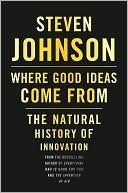More on this book
Community
Kindle Notes & Highlights
The history of life and human culture, then, can be told as the story of a gradual but relentless probing of the adjacent possible,
Instead, most important ideas emerged during regular lab meetings, where a dozen or so researchers would gather and informally present and discuss their latest work.
physical architecture of our work environments can have a transformative effect on the quality of our ideas.
So part of the secret of hunch cultivation is simple: write everything down.
central tension between order and chaos, between the desire for methodical arrangement, and the desire for surprising new links of association.
And the quickest path to innovation lies in making novel connections.
Serendipity is built out of happy accidents, to be sure, but what makes them happy is the fact that the discovery you’ve made is meaningful to you.
innovation prospers when ideas can serendipitously connect and recombine with other ideas,
create an environment where brainstorming is something that is constantly running in the background,
architecture for organizational serendipity.
A match you light to illuminate a darkened room turns out to have a completely different use when you open a doorway and discover a room with a pile of logs and a fireplace in it.
Chance favors the connected mind.
Genres supply a set of implicit rules that have enough coherence that traditionalists can safely play inside them, and more adventurous artists can confound our expectations by playing with them.
innovation thrives in discarded spaces.
It is in the nature of good ideas to stand on the shoulders of the giants who came before them, which means that by some measure, every important innovation is fundamentally a network affair.
Universities have a reputation for ivory-tower isolation from the real world, but it is an undeniable fact that most of the paradigmatic ideas in science and technology that arose during the past century have roots in academic research.
The connectedness of modern life means that we face the opposite problem: it is much harder to stop information from spilling over than it is to get it into circulation.
There are good ideas, and then there are good ideas that make it easier to have other good ideas.
You do business in the big city, but the city itself belongs to everyone.
Go for a walk; cultivate hunches; write everything down, but keep your folders messy; embrace serendipity; make generative mistakes; take on multiple hobbies; frequent coffeehouses and other liquid networks; follow the links; let others build on your ideas; borrow, recycle, reinvent. Build a tangled bank.


